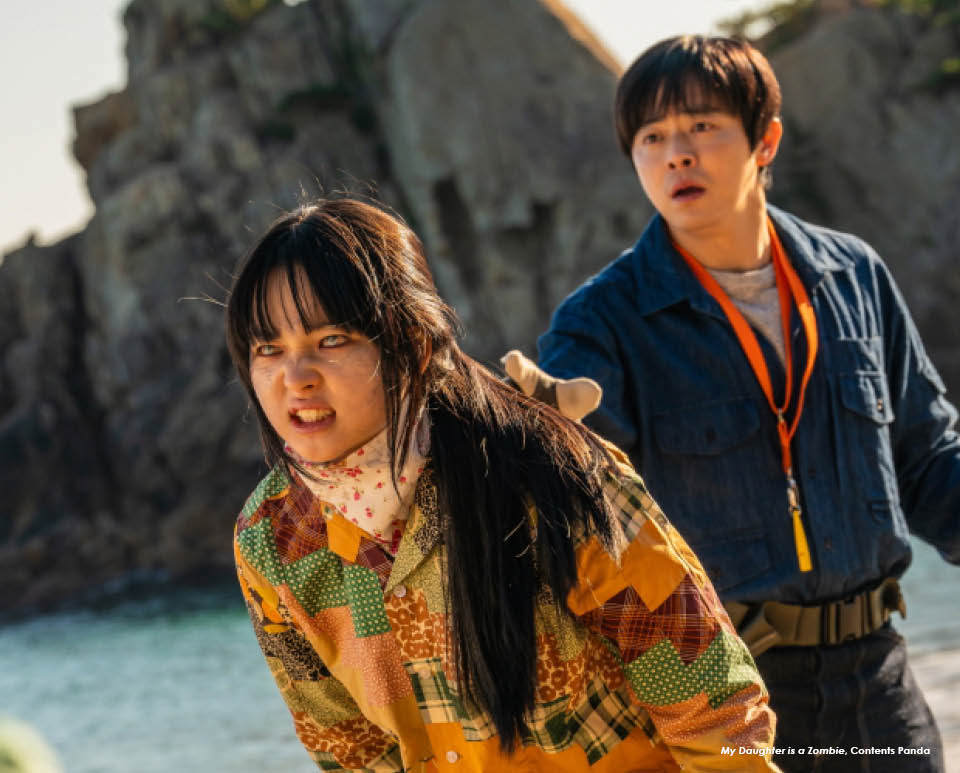
For one weekend in mid-August, six Asian films made the global box office Top 10 – three Chinese films, two Indian productions and one Japanese – all part of a Summer rebound in major East Asian territories after a slack Spring. This represents both a relief for struggling cinema operators and a welcome return to conventional seasonal patterns, says Patrick Frater.
Cinema business activity over the Summer has rebounded after a slack Spring in several major East Asian territories. That represents both a relief for struggling cinema operators and a welcome return to conventional seasonal patterns.
In South Korea, the 4 July to 10 August period threw up six consecutive weekends with nationwide cinema revenues in excess of US$10 million. In the first six months of 2025 there had only been one.
The mini-boom was powered by a healthy mix of Korean-produced and imported titles, which have delivered the top results seen so far this year.
Local feature My Daughter is a Zombie is this year’s most watched film with 4.31 million tickets sold since release on 30 July. Apple’s F1: The Movie claims the crown for highest gross to date in 2025 at US$31.8 million.
Daughter reverses the usual zombie horror narrative and instead its story sees a father who embarks on a life-or-death mission to train his daughter, the last remaining zombie.
F1’s performance is a particular triumph for Imax, which helped turn the car-racing thriller into a must-see event. After opening in late June, it achieved the rare feat of returning to the top of the Korean charts in its fourth week of release. This in a country without much of a Formula One track record; Korea is not host to a F1 race and the country has not yet produced a top-flight driver.
Other summer highlights have included big-budget Korean fantasy Omniscient Reader (US$7.19 million) and imported adventure franchise instalment Jurassic World: Rebirth, which has a US$15.3 million total.
Before Covid, Summer seasons were often marked by a mix of Korean-produced horror-comedy films and Hollywood tentpoles, and had become a key boost for Korean cinema.
One explanation for this annual mid-year bump is that the oppressive...
For one weekend in mid-August, six Asian films made the global box office Top 10 – three Chinese films, two Indian productions and one Japanese – all part of a Summer rebound in major East Asian territories after a slack Spring. This represents both a relief for struggling cinema operators and a welcome return to conventional seasonal patterns, says Patrick Frater.
Cinema business activity over the Summer has rebounded after a slack Spring in several major East Asian territories. That represents both a relief for struggling cinema operators and a welcome return to conventional seasonal patterns.
In South Korea, the 4 July to 10 August period threw up six consecutive weekends with nationwide cinema revenues in excess of US$10 million. In the first six months of 2025 there had only been one.
The mini-boom was powered by a healthy mix of Korean-produced and imported titles, which have delivered the top results seen so far this year.
Local feature My Daughter is a Zombie is this year’s most watched film with 4.31 million tickets sold since release on 30 July. Apple’s F1: The Movie claims the crown for highest gross to date in 2025 at US$31.8 million.
Daughter reverses the usual zombie horror narrative and instead its story sees a father who embarks on a life-or-death mission to train his daughter, the last remaining zombie.
F1’s performance is a particular triumph for Imax, which helped turn the car-racing thriller into a must-see event. After opening in late June, it achieved the rare feat of returning to the top of the Korean charts in its fourth week of release. This in a country without much of a Formula One track record; Korea is not host to a F1 race and the country has not yet produced a top-flight driver.
Other summer highlights have included big-budget Korean fantasy Omniscient Reader (US$7.19 million) and imported adventure franchise instalment Jurassic World: Rebirth, which has a US$15.3 million total.
Before Covid, Summer seasons were often marked by a mix of Korean-produced horror-comedy films and Hollywood tentpoles, and had become a key boost for Korean cinema.
One explanation for this annual mid-year bump is that the oppressive heat and humidity, which drives people into air-conditioned cinemas. Horror films are a summer staple in Korea and are said to create (welcome) cold sweats. A more prosaic explanation could be the effects of academic holidays and a wide selection of entertaining titles on offer.
But Korean movies and Korean exhibitors have both struggled to recover post-Covid and this summer’s modest rebound cannot be taken for granted.
A similar pattern could be observed in mainland China. This year the industry enjoyed a spectacular Lunar New Year season, but from February to June activity was mostly weak. Summer, which commentators define differently, has been notably firmer.
Imported titles Jurassic World: Rebirth and Japanese animation Detective Conan The Movie: One-Eyed Flashback both enjoyed US$25 million opening weekends.
But their exploits have been overtaken by a strong succession of Chinese-made pictures. Chief among these have been The Lychee Road (with a US$94 million haul) and the patriotic-historical Dead to Rights, which has earned US$357 million in its first four weeks on release.
In August, Dead to Rights was displaced from the top spot by Nobody, the second Chinese-produced animated film to head the box office charts this year. It follows all-time record breaker Ne Zha 2, which dominated proceedings in January and February and earned an astonishing US$2 billion.
Based on stories about four minor characters from the traditional Journey to the West tale, Nobody is reported to also be the highest-grossing Chinese film ever made using the traditional 2D animation process, rather than CGI or 3D animation. In 16 days of release, Nobody has accumulated US$139 million of gross revenues.
In Japan, the world’s third-richest cinema market after North America and China, there have also been Summer fireworks. Demon Slayer: Kimetsu no Yaiba – The Movie: Infinity Castle has become the highest grossing film of the year and the fifth biggest film of all time at the Nippon box office. Kimetsu no Yaiba is both a continuation of a franchise that straddles film and TV and the first of a trilogy of feature films.
After 30 days on release, it achieved ¥25.32 billion (approx. US$170 million). It overtook the iconic Your Name and is on course to surpass Frozen and Titanic, though it is currently short of overall record-holder Kimetsu no Yaiba – The Movie: Mugen Train, which amassed ¥40.43 billion in 2021.
The success of the Asian films this Summer has also impacted global box office. Over the 15-17 August weekend, Nobody was the world’s second-best performing movie, while Kimetsu no Yaiba was third. And the weekend top 10 included three Chinese films, two Indian productions and one Japanese – alongside four Hollywood titles.































